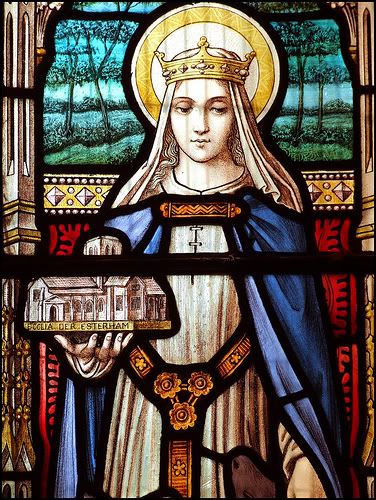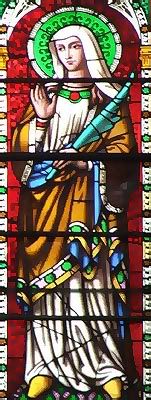Today, July 8, we celebrate the feast of Saint Withburga (died 643), sister of Saint Etheldreda, miracle worker, foundress of the Convent at East Dereham, and Abbess. The simple and obedient life of Saint Withburga inspires us to discern the will of God in our own lives, following His plan to our best ability.
Born the youngest daughter of Anna, King of East Anglia, Withburga grew up in a privileged class, considered a princess. Upon her father’s death, while she was still quite young, Withburga was sent with her nurse to live in a small town near Norfolk called Dereham. There, she grew in piety and love for the Lord, and established a small nunnery with the help of her sister, Etheldreda. She served as Abbess of the fledgling community, which grew considerably under her direction. As the community grew, Withburga eventually began construction of a church.
It is at that point that miracles began to occur, spreading her notoriety and drawing pilgrims to her construction site. As construction of the church continued, money was short. At times, Withburga had little more than bread to feed her workers. One night Our Blessed Mother appeared to Withburga, saying “Send two of your women down to the stream every morning, where two does will stand to be milked.” This she did without question, and the two nuns found the deer waiting, as promised. As a result, there was butter and cheese for all to add to their diet, and the construction progressed with great speed.
Saint Withburga came to be recognized for her great piety, patience, and advice. She was sought out be locals, as well as by leaders from far away. The local official, jealous of the positive attention she was receiving, set off with his hounds to kill the miraculous deer, but was instead thrown from his horse and died of a broken neck. All present reported this as miraculous, which only increased the stream of pilgrims to the area—visiting the stream, the church, and hoping for an audience with Withburga herself.
Saint Withburga died prior to the completion of the church. Pilgrims continued to flock to her graveside, where numerous miracles were reported. Upon exhumation (55 years after her death), her body was discovered to be incorrupt, and moved into a shrine contained within the completed church. Having consecrated herself a virgin while alive, Saint Withburga’s corpse is said to have blushed when one of the men who exhumed the body brushed her check with his finger. Years later, the saint’s relics were stolen from her tomb (by a well-intentioned bishop), and translated to Ely, to be placed next to her sisters. Where her body had been, fresh water sprang forth, and continues to flow freely today. Saint Withburga’s Well has never run dry (despite drought), and some have claimed miraculous healing due to prayer and imbibing of the clear water.
Saint Withburga’s simple faith and obedience allowed her to create an active religious community, offer healing and advice to believers, and feed those who were hungry. Her life is remembered as one of purity and hard work, turning from a privileged life and dedicating herself to the Lord. We look to her for inspiration—just as the pilgrims of her day did-- in making our daily life choices. What advice might Saint Withburga give each of us, were we to ask her today?





No comments:
Post a Comment
Thanks for leaving a comment. If you wish to submit a prayer request, however, please do so above, using the "Contact" tab.